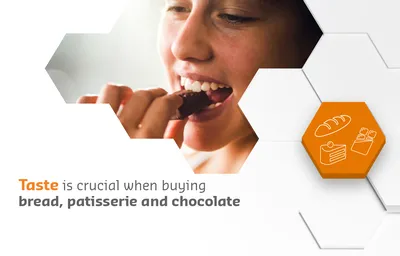9 Aug 2019
Wondering how today’s consumers define artisan breads and what you need to do in order to respond to this growing consumer interest as a professional in the baking industry? We will walk you through what you need to know about artisan-style breads, also known as craft, rustic or handmade breads.
The future of bread looks promising as consumer preferences shift towards more wholesome ingredients and artisanal crafted products. Consumers value the work and expertise of artisans and are interested in the traditions and history shared through products - artisan-style bread is no exception. In fact, Puratos’ latest Taste Tomorrow survey revealed that 66% of Canadian consumers are willing to pay more for handcrafted baked goods. This explains the steady rise of artisan-style breads in the Canadian market, as more customers value craftsmanship in their baked goods.
What are Artisan-Style Breads?
Artisan-style breads are part of consumers desire for a more authentic, real experience when it comes to the bread they buy and consume. Typical artisan-style breads can be identified by: their flavour, the look of the final product, and the storytelling. In short, these are breads with a true identity.
Thanks to growing consumer interest, this type of breads has become popular amongst a wide spectrum of bakers, from artisans to industrial, in fresh to packed applications. Furthermore, artisan-style goes beyond the typical crusty, premium breads. Today, in the market, standard, everyday breads with a little something extra are gaining popularity. In short, these are breads with that bit of flavour, more traditional ingredients, and the artisanal look of both the product and packaging. Developing and promoting artisan style breads is the opportunity to showcase your passion, baking expertise and share your tradition and heritage.

How can you enhance your bread offering and make it more premium?

When it comes to artisan-style breads, it comes down to two important aspects: the ingredients and the process. And in both, an ingredient such as sourdough can play a vital role. Clearly this hasn’t gone unnoticed by bakers, since around the globe, one of seven bread launches have been made using sourdough (Mintel, 2019).
Sourdough, that involves fermenting flour with natural flora, is a traditional bakery ingredient and has been around for thousands of years. Natural flora is typically made up of lactic acid bacteria, as found in yogurts and wild types of yeast. This mixed fermentation has a hugely positive effect on the complexity of the bread’s flavour and makes sourdough a key ingredient to achieve artisan, rustic style characteristics.
The flavours of sourdough vary based on the sourdough’s flour type, fermentation time, temperature, processing and their microbial starting culture. Not only does this make sourdough a very complex ingredient, it also means there are unlimited flavour varieties. This provides you with an opportunity to create differentiating, signature flavours that can enrich every type of baked good.
Sourdough: A golden opportunity for you to build your story
Its traditional heritage makes sourdough a perfect ingredient for communication, especially as consumers already have such a positive image of sourdough. This is particularly important when you realize that 65% of the world’s consumers want bakers to tell them more about baking’s rich traditions. (Puratos Sourdough Consumer Research, 2017).
Bakers today have the possibility to use sourdough to make their breads more unique, with their own signature flavour, and adapt their breads to the regions’ flavour preferences. At Puratos, we believe that the future of bread lies in its past. Over the years we’ve developed expertise in natural fermentation and knowledge of baking cultures from all over the world.
Drawing on this knowledge, we’ve created O-tentic and Sapore - a range of natural bakery sourdoughs that provide consistent quality, convenience and exceptional diverse flavours. These sourdough ingredients give you the flexibility to choose the taste and structure of all your finished baked products from tasty everyday breads, to the real premium pain-au-levain. Our sourdoughs help you to renovate and allow you to differentiate your existing range of baked goods – whether it be croissants, pizza, pan breads or crusty breads and rolls. Take it up a notch, share your passion and tradition through your artisan breads and we believe that you will see your customer interest grow and sales increase.

Want to know more?
Click here to learn more about our sourdough solutions or contact Puratos Canada to obtain more details.
This article has been written by Danielle Aucoin, Product Manager – Bakery, Puratos Canada, in collaboration with our Sourdough team from Puratos Headquarters in Belgium. Danielle has 10 years of experience in the Canadian bakery industry – in both the retail and foodservice markets and shares a passion for innovation and baked goods.







